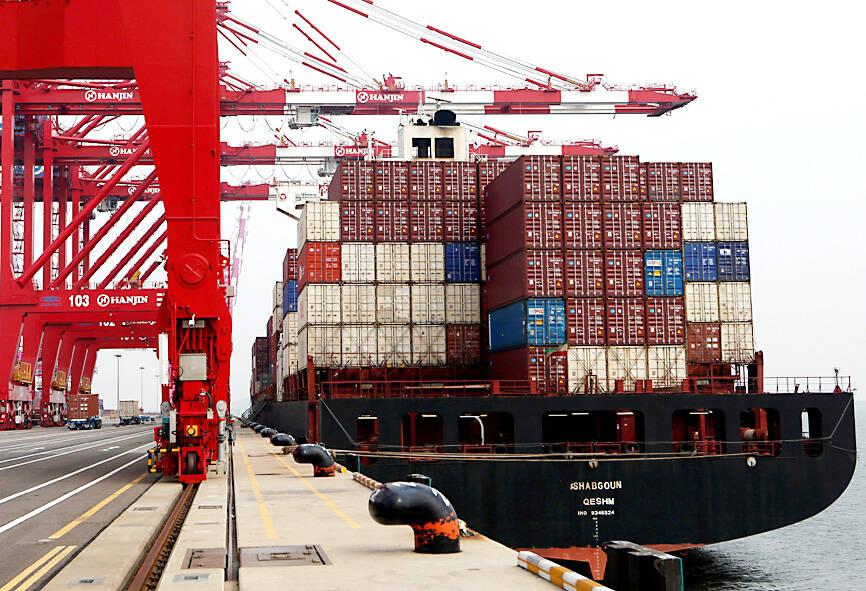South Korea’s exports returned to growth on the back of continuing demand for semiconductors, in a positive sign for policymakers seeking to shore up the trade-reliant economy against any potential headwinds from US president-elect Donald Trump’s tariff plans.
Exports adjusted for working-day differences rose 3.6 percent last month from a year earlier, rebounding from a dip in the prior month, data from the South Korean Ministry of Trade, Industry and Energy showed yesterday. Headline exports climbed 1.4 percent while imports decreased 2.4 percent, resulting in a trade surplus of US$5.6 billion.
Semiconductor exports increased 30.8 percent from a year earlier to US$12.5 billion, the trade ministry said. Still, it was the slowest growth since late last year.

Photo: REUTERS
South Korea is one of the world’s most export-reliant nations, and its vulnerability to protectionism has raised concerns among policymakers and business leaders in Seoul after Trump vowed to increase tariffs on trading partners.
While South Korea might be subjected to universal tariffs of just 10 percent, it could also sustain indirect damage from larger duties targeting some of its key trading partners. Trump has pledged 60 percent charges for China, South Korea’s biggest trading partner.
The Bank of Korea on Thursday slashed its benchmark interest rate in a surprise back-to-back move aimed at girding the economy for any potential headwinds stemming from Trump’s return to the White House next month.
The central bank has already voiced concerns about a softening in the export growth of technology products. South Korea is home to two of the world’s biggest memory chip manufacturers, and its businesses are widely embedded across global technology supply chains.
“Trump’s return to the White House suggests a tumultuous period lies ahead, with higher US tariffs and fresh US-China trade frictions impairing the smooth flow of goods and the functioning of supply chains,” Dave Chia, an associate economist at Moody’s Analytics, said in a note. “As a key US and China trading partner, South Korea could be caught in the middle.”
Demand from both China and the US slipped last month. Shipments to China edged down 0.6 percent from a year earlier while those to the US fell 5.1 percent, the trade ministry said.
Separately, South Korea has the capacity to purchase more US energy, which is competitive in cost with Middle East imports, Yonhap News yesterday cited Minister of Trade, Industry and Energy Ahn Duk-geun as saying.
Ahn told Yonhap that the country needs to expand US imports to reduce trade surplus with the US and plans to fold it into policy “constructively,” while private companies can take it into consideration as part of their business strategies.
The minister’s comments suggest South Korea will seek to encourage US energy imports through government-run firms and private refiners, Yonhap said. US gas and oil prices are “reasonable,” making it easier for South Korea to procure them, Ahn told Yonhap.
During Trump's election campaign, he vowed to narrow trade deficits with other countries through tariffs and increase US oil and gas production to establish what he called energy dominance.

The US dollar was trading at NT$29.7 at 10am today on the Taipei Foreign Exchange, as the New Taiwan dollar gained NT$1.364 from the previous close last week. The NT dollar continued to rise today, after surging 3.07 percent on Friday. After opening at NT$30.91, the NT dollar gained more than NT$1 in just 15 minutes, briefly passing the NT$30 mark. Before the US Department of the Treasury's semi-annual currency report came out, expectations that the NT dollar would keep rising were already building. The NT dollar on Friday closed at NT$31.064, up by NT$0.953 — a 3.07 percent single-day gain. Today,

‘SHORT TERM’: The local currency would likely remain strong in the near term, driven by anticipated US trade pressure, capital inflows and expectations of a US Fed rate cut The US dollar is expected to fall below NT$30 in the near term, as traders anticipate increased pressure from Washington for Taiwan to allow the New Taiwan dollar to appreciate, Cathay United Bank (國泰世華銀行) chief economist Lin Chi-chao (林啟超) said. Following a sharp drop in the greenback against the NT dollar on Friday, Lin told the Central News Agency that the local currency is likely to remain strong in the short term, driven in part by market psychology surrounding anticipated US policy pressure. On Friday, the US dollar fell NT$0.953, or 3.07 percent, closing at NT$31.064 — its lowest level since Jan.

The New Taiwan dollar and Taiwanese stocks surged on signs that trade tensions between the world’s top two economies might start easing and as US tech earnings boosted the outlook of the nation’s semiconductor exports. The NT dollar strengthened as much as 3.8 percent versus the US dollar to 30.815, the biggest intraday gain since January 2011, closing at NT$31.064. The benchmark TAIEX jumped 2.73 percent to outperform the region’s equity gauges. Outlook for global trade improved after China said it is assessing possible trade talks with the US, providing a boost for the nation’s currency and shares. As the NT dollar

The Financial Supervisory Commission (FSC) yesterday met with some of the nation’s largest insurance companies as a skyrocketing New Taiwan dollar piles pressure on their hundreds of billions of dollars in US bond investments. The commission has asked some life insurance firms, among the biggest Asian holders of US debt, to discuss how the rapidly strengthening NT dollar has impacted their operations, people familiar with the matter said. The meeting took place as the NT dollar jumped as much as 5 percent yesterday, its biggest intraday gain in more than three decades. The local currency surged as exporters rushed to